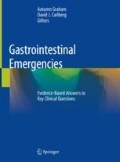Abstract
Patients who are immunocompromised are at risk for serious intra-abdominal pathology compared to their age-matched counterparts. Furthermore, they may not manifest typical signs and symptoms of severe illness until late in the disease course. The emergency medicine provider needs to maintain a high index of suspicion of serious pathology in these patients.
Access this chapter
Tax calculation will be finalised at checkout
Purchases are for personal use only
References
McKean J, Ronan-Bentl S. Abdominal pain in the immunocompromised patient—human immunodeficiency virus, transplant, cancer. Emerg Med Clin North Am. 2016;34(2):377–86. https://doi.org/10.1016/j.emc.2015.12.002.
Hardy A. Evaluation of the acute abdomen. In: Todd SR, editor. Common problems in acute care surgery. 1st ed. New York: Springer; 2013. p. 19–31.
Liu D, Ahmet A, Ward L, Krishnamoorthy P, Mandelcorn ED, Leigh R, Kim H. A practical guide to the monitoring and management of the complications of systemic corticosteroid therapy. Allergy Asthma Clin Immunol. 2013;9(1):30.
Arenas-Pinto A, Grant AD, Edwards S, Weller IV. Lactic acidosis in HIV infected patients: a systematic review of published cases. Sex Transm Infect. 2003;79:340–3.
Alby K, Nachamkin I. Gastrointestinal infections. Microbiol Spectr. 2016;4(3) https://doi.org/10.1128/microbiolspec.
Van den Heijkant TC, Aerts BA, Teijink JA, Buurman WA, Luyer MD. Challenges in diagnosing mesenteric ischemia. World J Gastroenterol. 2013;19(9):1338–4.
Ramakrishnan K, Scheid DC. Diagnosis and management of acute pyelonephritis in adults. Am Fam Physician. 2005;71(5):933–42.
Indar AA, Beckingham IJ. Acute cholecystitis. BMJ: Br Med J. 2002;325(7365):639–43.
Author information
Authors and Affiliations
Corresponding author
Editor information
Editors and Affiliations
Rights and permissions
Copyright information
© 2019 Springer Nature Switzerland AG
About this chapter
Cite this chapter
Lee, M.C., Perkins, J. (2019). An Introduction: Is My Patient Immunocompromised? How Do I Interpret History and Physical Examination Findings in the Immunocompromised Patient? What Does the Work-Up Look Like for an Immunocompromised Patient? What Are the Unique Risks and Potential Pitfalls?. In: Graham, A., Carlberg, D.J. (eds) Gastrointestinal Emergencies. Springer, Cham. https://doi.org/10.1007/978-3-319-98343-1_111
Download citation
DOI: https://doi.org/10.1007/978-3-319-98343-1_111
Published:
Publisher Name: Springer, Cham
Print ISBN: 978-3-319-98342-4
Online ISBN: 978-3-319-98343-1
eBook Packages: MedicineMedicine (R0)

